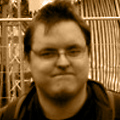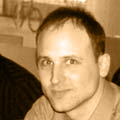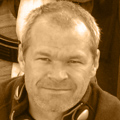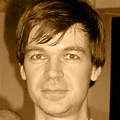Final lineup now, still missing summaries from a few of our speakers :).

|
TyRaNiD.
1. "The Naked PSP - Playstation Portable System Overview" (Saturday, 11:15) 2. "The Naked PSP - Playstation Portable Software Development" (Sunday, 12:30) Console hacker and author of the development tool PSPLINK, TyRaNiD has had a connection to games console homebrew development since the Sega Saturn, passing through to the Playstation 2 to the Playstation Portable, writing the occasional demo on the way. Has an interest in all things low-level, getting to grips with the inner workings of systems and how best to exploit them for everyones benefit. He is currently helping to develop the PSP software and tools (including the toolchain and the SDK) to further the creation of free PSP demos and games." The first half of the Naked PSP goes into the hardware Sony built for the Playstation Portable, what it contains and how it was that a supposedly secure system came to be so full of holes. The second half covers aspects of software development for the handheld device with description of the toolchain and SDK available for free, some of the tools useful in speeding up PSP development and a run through of the PSP software architecture and API sets that are most useful for demo developers. |

|
Jens Schönfeld / Individual Computers
"Clone-A: An Amiga chipset on an single low-cost chip" (Sunday, 11:15) Jens Schönfeld is known best for the various impressive C64 and Amiga based hardware projects he designs and builds. He also supports other hardware designers by producing and distributing their hardware through his company Individual Computers. Jens is a long-time financial supporter of various scene-related projects and parties. Jens will first describe the Clone-A chipsets history of development (how it was done, what did it take to do etc.). He'll then talk about commercial targets and chances for programmers and investors, and end the seminar with a demonstration of the chipset with visitor's software: this will be the most interesting part for all those people who doubt that Clone-A is a true Amiga. Bring your software on a floppy disk and put it to the test! We will of course prepare some programs, demos and games, but the ultimate est will be made with your software. This shows that we're not carefully selecting the software that we demonstrate - you do it, and by doing so, you make sure that Clone-A is a worthy successor to the classic Amiga computer. The demonstration machine will have a 68000 processor at 7MHz, 1M of chipmem and optional fastmem. |

|
Iñigo 'iq' Quilez / rgba
"Tricks and techniques for rgba's past and future intros" (Sunday, 10:00) iq discovered and joined the demoscene in 1998 when it was about time to exchange the qbasic interpreter for a C compiler. In his spare time he is half dedicated to fractal mathematics and -art (where he is quite well known) and half to the demoscene. iq is desperately trying to delay his scene-retirement by producing 64k intros whenever he finds the time to. For the past three years his job was realtime raytracing and rasterization for massive models in parallel systems. rgba's approach to 64k intro creation is quite different to the state of the art techniques common to other groups. The lack of any tool for content creation or even synchronization strongly influences the way our intros are created - both from the code point of view as well as from the artist's position. Beside discussing if this is a drawback or not, we will review the coding/compression techniques rgba was forced to develop and take a look at other techniques applicable to any intro system. We will also introduce a few techniques we have developed for future intros such as automatic skinning and cloth simulation. Finally we will point out what rgba believes what the future of 64k intros may become. |

|
Carsten 'toxie' Wächter / ainc. / metalvotze
"Time for a Change: Ray Tracing for the Masses" (Saturday, 12:30) Toxie has been around the scene since 95 and released his first real contribution in 99. Apart from coding demos (best known: "232" and "Winnerdemo") he also released some games (best known: the tempest 2000 remix "tsunami 2010") and a commercial screensaver for gizmozone/shortcut. He's an active scientific researcher (PhD should be finished around september 07) in the field of realtime ray tracing, global illumination and quasi-monte carlo since 2004 and some of the results are already used commercially in the products of mental images. Unfortunately, 2007 will see the final(?) release by ainc. as spare time has become a valuable good. Apart from that there might still be a small chance to see a "Winnerdemo II" sometime in the future. ;) Ray tracing is well known for superior image quality and simple shading algorithms. Even realtime ray tracing has been around for quite some time in the scene and was being picked up by dozens of researchers around the globe during the last five years. The latest developments even promise to make ray tracing a serious competitor for traditional rasterizers/GPUs in the upcoming years. This talk presents the current state of the art algorithms and tricks and especially the latest work of the Ulm graphics group.
computer graphics, university of ulm
|

|
Jonathan P. Story / intel
"Debugging and Tuning Multi-Threaded Games" (Saturday, 10:00) Jonathan Story is an Application Engineer working within the Consumer Software Enabling team at Intel GmbH in Munich. The main focus of his work is supporting game developers in Europe. With around ten years of experience in the games industry Jonathan has a wealth of programming knowledge in the fields of 3D, optimization and multi-threading. Jon has previously worked at Codemasters and Silicon Dreams Studio. As we move forwards into the multi-core age, the diversity of machines that software needs to run on is expanding, thus great care needs to be taken in testing for performance and correctness of behavior. This session will cover some of the fundamental pitfalls of designing multi-threaded games and how these threading issues can be tracked using modern tools including the Intel® VTune™ Performance Analyzer and the Intel Thread Profiler. A case study will feature a live demonstration of the tools and how the resulting data could be used to make improvements. |

|
Uwe Boll
"Transforming games to movies" (Saturday, 15:00) Boll's first two major releases were the horror movie Blackwoods, and the drama Heart of America, both of which he directed and co-wrote. Boll also has a horror film Seed in production. However, Boll is most famous for adapting videogames into movies. He has directed and produced a number of such adaptations, among them House of the Dead, Alone in the Dark, and BloodRayne. He has announced plans to produce adaptations of Dungeon Siege, Postal, and Far Cry. Boll also intends to produce a sequel to Alone in the Dark, and BloodRayne II: Deliverance, as well as a third movie based on the BloodRayne franchise. (we don't have a summary yet) |

|
Anatol 'dang`r`us' Ulrich / neuro
"Visual effects with Quartz Composer" (Sunday, 13:45) As a neuro member, dang`r`us does not, in fact, exist. Nevertheless he has used his Quartz Composer skills to drive a BBC live show in 2006. Largely unnoticed by the scene (and everybody else), Apple has released Quartz Composer, a free visual programming language similar to demo tools. Support for GLSL Shaders, scripting, plugins and various input devices make it attractive as a platform for developing interactive, real-time visual arts. |

|
Dierk 'chaos' Ohlerich / farbrausch
"From demo coding to console game development" (Saturday, 17:30) Dierk 'chaos' Ohlerich, co-author of demos like "arte" and "the popular demo", has made the progression from demo coding to professional game development. He is now co-founder and lead programmer at Germany's leading console game developer: 49games. Developing games for consoles is very different from developing games for PC. Not only technical issues need to be addressed, working together with the platform licenser has implications to every stage of project management. Dierk 'chaos' Ohlerich will talk about his experience in the "industry" and the specific problems of console game development. |

|
Peter Fankhänel
"Making emotions digital" (Saturday, 13:45) Peter Fankhänel originally studied "Textiltechnik" (textile technology); but in 1989, he founded the company BLITZ Datentechnik to develop special-purpose software, which entered internet business around 1995. In 1999, they started developing and maintaining the Liebe.de-database (a german online partnership agency) and founded the Liebe.de GmbH. In 2006, he started a cooperation with Prof. Dr. Dietrich Dörner to continue development of the "PSI" system. Advanced Magic GmbH develops software to simulate human behaviour. Based on research done by Prof. Dr. Dietrich Dörner at the University of Bamberg in theoretical psychology, we develop a modular system to simulate human emotions including fear, sadness, happiness and anger. The artificial emotions in turn modulate behaviour exactly like in natural beings including humans. The system continually learns from good and bad experience and improves its capabilities. We propose the system to control non player characters in computer games. |

|
Enno 'cosowi' Coners / Plush
"C64 oddities" (Saturday, 16:15) Cosowi founded the German Commodore 64 fanzine GO64! in 1996. The main focus of his publishing is to support the Demo- and Retroscene with professional books and magazines. As collector of Commodore 8-Bit machines above ten years he has a wealth of Commodore Computers. Cosowi will give a short information about the history of Commodore and show rare C64 versions and some other oddities stuff out of his Commodore collection. |

